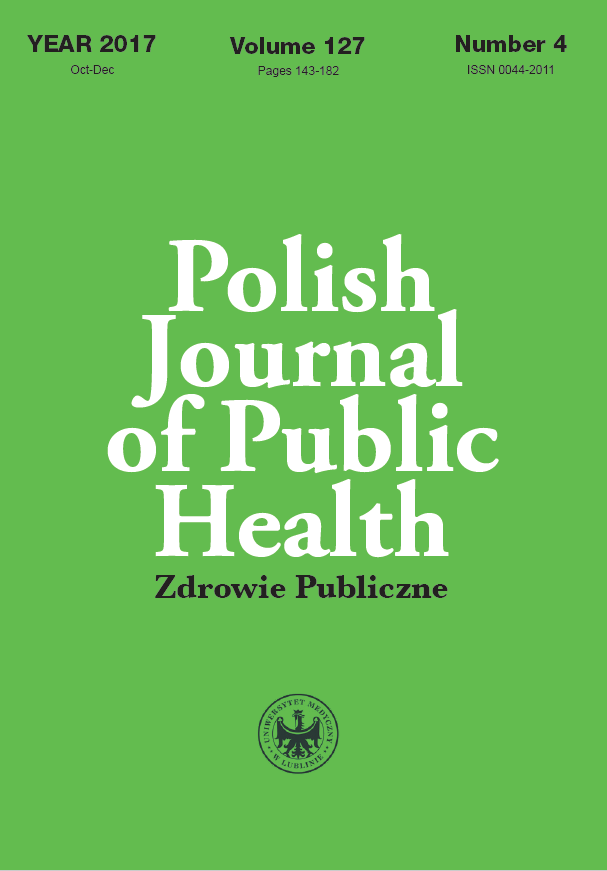Pregnant women’s attitudes towards organic food
DOI:
https://doi.org/10.1515/pjph-2017-0034Keywords:
organic food, pregnant women, children, healthy nutritionAbstract
Introduction. Proper and healthy nutrition during pregnancy is one of the strongest external determinants of normal development of the foetus. Due to its health-enhancing properties, organic food is its desirable element. Therefore, the analysis of the consumer behaviour associated with organic food among pregnant women seems relevant, in particular given the small number of scientific reports addressing this problem.
Aim. The aim of the study was to analyse pregnant women’s behaviour and attitudes towards organic food. The investigations included opinions of the entire group of respondents and was intended to show differences between individual groups of women classified in terms of having children already or not.
Material and methods. The survey involved 100 pregnant women living in Lublin and its surroundings, which were assigned into two survey groups: women already having children and those without children. An anonymous questionnaire designed as part of the study was the research tool. The questions were focused on indication of the motivations in the purchase and sources of information about organic food as well as consumer behaviour on the organic food market.
Results. A majority of pregnant women assessed their financial situation as satisfactory. The main motive behind buying organic food was their wish to take special care of their health during the pregnancy period and the need to take care of the family. The women were familiar with the concept of organic food. Commercials were the frequent source of information among women expecting the first child and the Internet was the main source of information for those already having children. As specified by the pregnant women, health benefits, naturalness and the absence of chemical contamination are the characteristic features of organic food. Most of the respondents declared an intention to feed their children with organic food to minimise the exposure to chemical contamination.
Conclusions. There were differences in the use of sources of information about organic food or the importance of individual determinants of their purchase by the pregnant women. This knowledge can be used on the organic food market to develop marketing solutions, which will be useful in satisfying the needs of this group of consumers more effectively.
References
1. Hermaniuk T. Organic food market in Poland – main characteristics and factors of development. Sci Ann Econ Bus. 2016;63(1):135-47.
2. Miśniakiewicz M, Suwała G. Żywność ekologiczna w świadomości Polaków. Zesz Nauk. AE Krak. 2006;705:57-75.
3. Kummeling I, Thijs C, Huber M, et al. Consumption of organic foods and risk of atopic disease during the first 2 years of life in the Netherlands. Br J Nutr. 2008;99(3):598-605.
4. Torjusen H, Lieblein G, Næs T, et al. Food patterns and dietary quality associated with organic food consumption during pregnancy; data from a large cohort of pregnant women in Norway. BMC Public Health. 2012;12(1):612. doi.org/10.1186/1471-2458-12-612.
5. Torjusen H, Brantsaeter AL, Haugen M, et al. Reduced risk of pre-eclampsia with organic vegetable consumption: results from the prospective Norwegian Mother and Child Cohort Study. BMJ Open. 2014;4(9). doi:10.1136/bmjopen-2014-006143.
6. Stupnicki R. Analiza i prezentacja danych ankietowych. Warszawa: Wyd. Akademia Wychowania Fizycznego; 2003.
7. Stanisz A. Przystępny kurs statystyki na przykładach z medycyny z wykorzystaniem programu Statistica, t. I, wyd. II. Kraków: Statsoft; 2006.
8. Samolińska W, Kiczorowska B. Żywność ekologiczna w opinii internautów – doniesienia wstępne. Probl Hig Epidemiol. 2013;94(3):630-4.
9. Samolińska W, Kiczorowska B. Marzec A, et al. Żywność ekologiczna w opinii matek dzieci w wieku przedszkolnym w Lublinie. Probl Hig Epidemiol. 2017;98(3):266-70.
10. Kowalczuk-Vasilev E, Klebaniuk R, Gronowicz K. Żywność ekologiczna w opinii studentów różnych lat studiów uczelni lubelskich. Probl Hig Epidemiol. 2011;92(4):960-4.
11. Łuczka-Bakuła W. Rynek żywności ekologicznej. Wyznaczniki i uwarunkowania rozwoju. Warszawa: Polskie Wydawnictwo Ekonomiczne; 2007.
12. Przybyłowicz K, Kalinowska K. Żywienie kobiet w ciąży a stan urodzeniowy noworodków wyrażony indeksem Ponderala. Probl Hig Epidemiol. 2011;92(3):508-11.
13. Osera T, Tsutie S, Kobayashi M, et al. The effect of mothers’ and fathers’ food preferences on children’s preferences with their attitude. European J Nutr Food Saf. 2016;6(3):93-100.
14. Vereecken C, Maes L. Young children’s dietary habits and associations with the mothers’ nutritional knowledge and attitudes. Appetite. 2010;54(1):44-51
Downloads
Published
Issue
Section
License
Copyright (c) 2018 Polish Journal of Public Health

This work is licensed under a Creative Commons Attribution-NonCommercial-NoDerivatives 3.0 Unported License.


